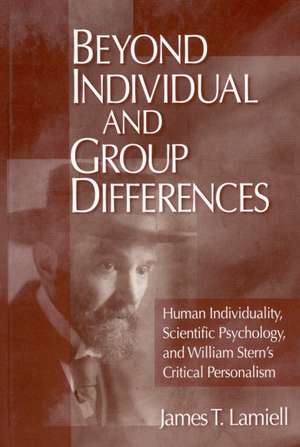Beyond Individual and Group Differences: Human Individuality, Scientific Psychology, and William Stern's Critical Personalism
Autor James T. Lamiellen Limba Engleză Hardback – 8 sep 2003
· Provides book-length treatment of the concept of human individuality in twentieth century scientific psychology, highlighting the historical contributions made by the German psychologist and philosopher William Stern (1871-1938).
· Critically appraises contemporary thinking about personality in light of historical and methodological considerations.
· Challenges readers to re-think the problem of human individuality with research that mounts a direct empirical challenge to the long-standing belief that it is meaningless to characterize individuals without comparing them to one another.
· Concludes with a general discussion of the potential of personlistic thinking both as a foundation for personality theory and as a framework for social thought.
Preț: 846.80 lei
Preț vechi: 1032.69 lei
-18% Nou
162.09€ • 176.12$ • 136.24£
Carte tipărită la comandă
Livrare economică 21 aprilie-05 mai
Specificații
ISBN-10: 0761921729
Pagini: 360
Dimensiuni: 152 x 229 x 24 mm
Greutate: 0.58 kg
Ediția:New.
Editura: SAGE Publications
Colecția Sage Publications, Inc
Locul publicării:Thousand Oaks, United States
Recenzii
"Lamiell offers a critical analysis of the current state of the psychological study of human individuality. . . . The author makes a significant contribution in rescuing the work of an obscure intellectual pioneer and demonstrating its relevance to the contemporary study of individuality. Highly recommended."
"This book is fundamentally relevant in showing that the individual is returning to his or her central place in scientific psychology. ... The psychology of human beings must be built on the centrality of people's value making, and their use of these values in conducting their lives. ... Lamiell carries the reader out of the web of discourse about standardized methods and mundane correlational research to the wide thoroughfare of building a new version of idiographic science. ... Lamiell's positive methodological program fits the demands for consistency between the different components of the methodological cycle that unites theory, meta-theory, phenomena, methods and data in one system ... and demonstrates the value of knowing the history of science.
For anybody who appreciates depth of argumentation in psychology, Lamiell's book deviates in substantial ways from the opinions that have prevailed in psychology over the last fifty years and brings the discipline back to a place from which to develop a new idiographic science. ...
Lamiell's book ... is a rare treat in offering a synthesis of ideas in the very best tradition of general knowledge (science in the sense of Wissenschaft). It points psychology toward a new beginning; but will the discipline live up to that intellectual and social challenge?"
"There is much to admire in Gibbs’s important book. It is the only sustained scholarly attempt of which I am aware to synthesize the major traditions in cognitive and affective developmental research and theory, doing so by emphasizing both cognitive and affective capacities for taking the perspective of the other."
Cuprins
Part I: Historical Beginnings
2. The Problem of Individuality & the Birth of a "Differential" Psychology
3. The Narrowing of Perspective in the Proliferation of Standardized Testing & Correlational Research
4. The Entrenchment of a "Common Trait" Perspective on Human Individuality
Part II: Statistical Thinking in the Post-Wundtian Restructuring of Scientific Psychology
5. The Emergence of a "Neo-Galtonian" Framework for Psychological Research: An Historical Sketch
6. Contemporary "Nomotheticism" within the Framework of Neo-Galtonian Inquiry: A Methodological Primer
7. Contemporary "Nomotheticism" in Critical Perspective
Part III: Rethinking the Problem
8. An Introduction to Critical Personalism
9. Some Models of Personalistic Inquiry in Contemporary Psychology
10. Our Differences Aside: Persons, Things, Individuality, & Community
References
Name Index
Subject Index
Notă biografică
James T. Lamiell (Ph.D., Kansas State University, 1976) is Professor of Psychology at Georgetown University in Washington, DC, where he has taught since 1982. Prior to that, he was on the faculty at the University of Illinois at Urbana-Champaign. A three-time Fulbright Senior Scholar to Germany, Lamiell spent his spring semester 2004 sabbatical at the University of Hamburg where, during their summer semester (April to July), he was Ernst Cassirer Visiting Professor. During that time, he taught a seminar in the Psychology Department and also delivered a series of public lectures on "William Stern: His Life and Works" under the auspices of the Philosophy Department. He has held guest professorships at the University of Heidelberg (1990) and the University of Leipzig (1998). He is author of The Psychology of Personality: An Epistemological Inquiry (1987) and translator of Clara and William Stern¿s 1909 monograph Erinnerung, Aussage und Luge in der ersten Kindheit, published in English as Recollection, Testimony, and Lying in Early Childhood (1999). His numerous scholarly publications have primarily to do with theoretical and philosophical issues in the psychology of personality, and he has lectured on these topics at many universities in both the U.S. and Europe. Lamiell has served as Associate Editor of the Journal of Personality and the Journal of Theoretical and Philosophical Psychology. He was elected Fellow of APA Division 1 (General Psychology) in 1987 and Division 24 (Theoretical and Philosophical Psychology) in 1988. He was the honored recipient of the Psi Chi Award for Excellence in Undergraduate Teaching at the University of Illinois in 1979 and of the Edward B. Bunn Award for Faculty Excellence at Georgetown University in 2001. In his spare time, Lamiell enjoys picking bluegrass banjo and long-distance bicycle touring.
Descriere
Beyond Individual and Group Differences is a dynamic book for academics and scholars in the areas of personality psychology, individual differences, and the history of psychology.














